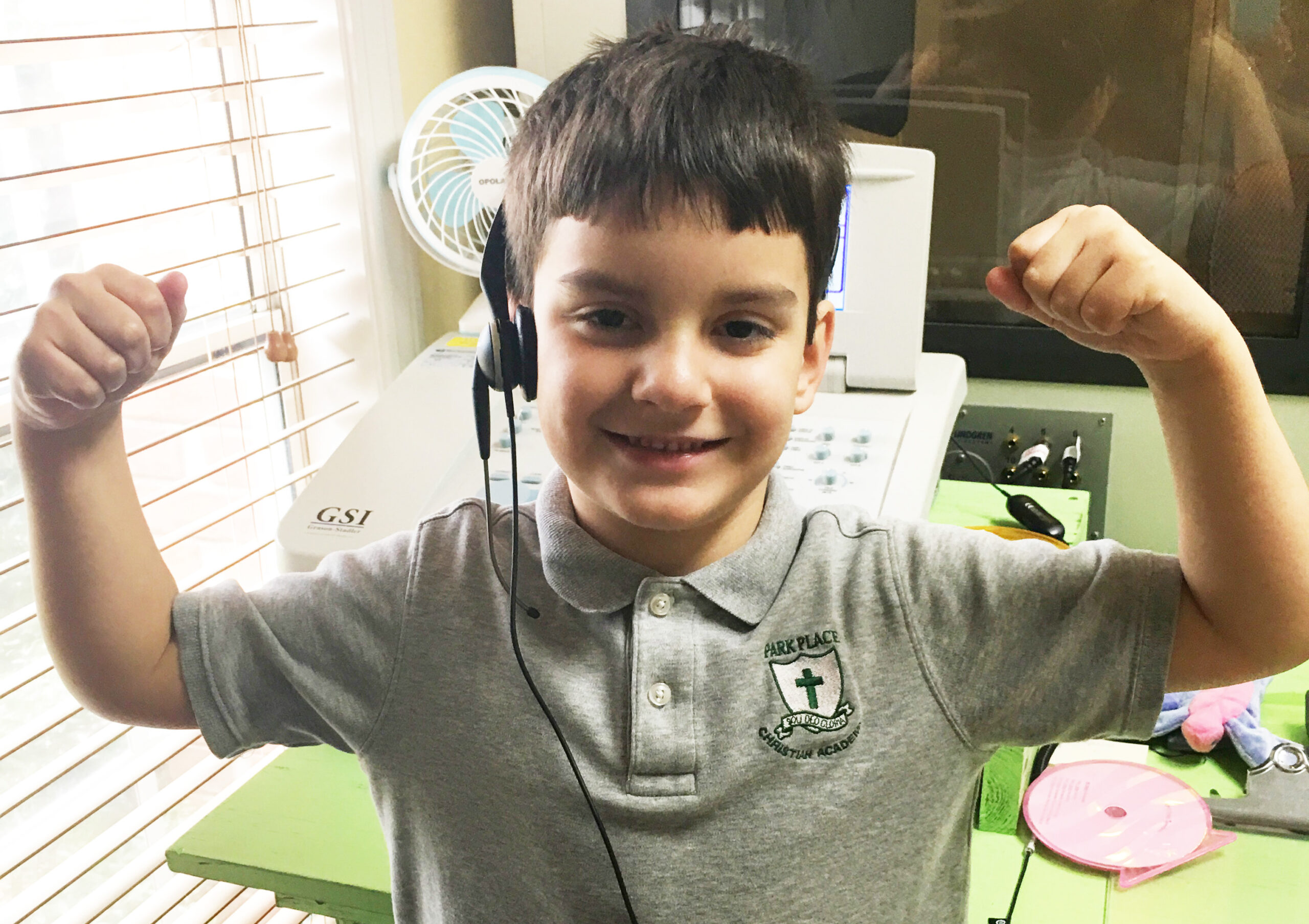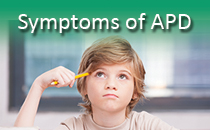APD is Treatable
Neural pathways and synapses in the brain change as a result of behavior, sensory input, and training. This neural reorganization is referred to as neuroplasticity. Auditory therapy takes advantage of the fact that neural responses to sound can be altered intentionally through intensive listening exercises. With the correct type of intervention, people with APD can greatly improve their skills, and some types of APD can be completely remediated. This is not just a theory but a reality that we witness every day at Auditory Processing Center.
Customized APD Therapy for Children and Adults
At Auditory Processing Center we offer APD therapy for children and adults with auditory processing disorder and those with hearing loss. Our mission is to help individuals struggling with listening comprehension, communication, and learning receive highly individualized treatment to overcome their challenges and reach their full potential. We strongly feel that auditory processing is too complicated for one approach to work for all individuals. This is why we offer a wide variety of treatment programs and personalized activities to address each individual’s specific auditory deficits. The type, frequency, and intensity of therapy will vary with each child or adult based on the specific type(s) of auditory processing issues identified.
We offer in-clinic therapy, online therapy, guided home-based treatment, and one-on-one teletherapy for auditory processing disorders. Our reports provide highly detailed recommendations for treatment tailored to enhance each individual’s development of essential listening skills. This often incorporates a wide range of auditory processing goals and activities, often targeted in stages one at a time or a few concurrently, recommendations for activities to do at home, suggested apps and software programs, effective teaching strategies and tips for teachers, and specific goals designed to collaborate with any speech-language pathologists working with your child.
Not Sure What Your Child Needs?
If you’re unsure which therapy services are right for your child, we offer consultations to help guide you. Our audiologist can review your child’s records, discuss your concerns, and recommend the best course of action. Whether it’s an in-depth evaluation or therapy options, we’re here to help you make informed decisions about your child’s auditory processing needs. Learn more about our consultations.
Individualized One-on-One APD Therapy
Deficit-specific auditory training sessions to improve auditory processing are provided both in the clinic and virtually.
In-clinic auditory Processing Therapy Services. Therapy sessions are typically scheduled once a week. Treatment may range from 4 weeks to 14 weeks, depending on the patient’s needs, followed by a progress assessment and discussion to update treatment recommendations.
Virtual auditory processing therapy. We offer one-on-one teletherapy for APD with our audiologists for individuals without access to a specialist in their area. We currently provide teletherapy services for patients in Mississippi, Louisiana, Florida, and Alabama.
Treatment goals are individualized and may include the following:
- Therapy to improve dichotic listening skills. The ears must work well together as a team, and it is quite common for individuals with auditory processing disorder to have deficits in this area. With dichotic listening tasks, the listener hears two different signals presented simultaneously, one to each ear, and is asked to attend to one (separation) or both (integration) signals. This requires that the two cerebral hemispheres work together. Auditory Processing Center offers Dichotic Listening Therapy to treat auditory integration deficits (where the relationship between different pieces of information cannot be recognized) and improve the accuracy and efficiency with which auditory information is transmitted to different regions of the brain. Auditory Processing Center is also one of only a handful of sites in the nation offering ARIA (Auditory Rehabilitation for Interaural Asymmetry), a program developed by Deborah W. Moncrief, Ph.D., CCC-A. This program incorporates dichotic listening therapy to treat amblyaudia, a condition where a child develops a dominant ear that suppresses sound information coming from the other side, creating a “lazy ear.”
- Auditory decoding and phoneme training exercises – such as improving auditory discrimination, phonemic awareness (sound segments that comprise words), phonemic training with Buffalo Model Therapy, multi-sensory phoneme training using right brain teaching strategies, or Auditory Processing Center’s phoneme training curriculum.
- Auditory short-term memory – such as memory span, memory duration training, working memory, auditory sequencing, and organization activities.
- Auditory closure – This involves improving the brain’s ability to recognize a message when some of the information is distorted or missing, such as processing filtered speech or using context to fill in words to complete sentences.
- Speech-in-noise/auditory figure-ground therapy and/or background noise desensitization. Difficulty hearing in background noise is a very common complaint in individuals with APD. However, the problem can arise from deficits in different mechanisms, and treatment must be individualized in order to be effective. Activities may include words in noise training, sentence understanding in noise, and auditory comprehension in noise.
- Auditory vigilance training to improve attention span and focus when listening to ongoing speech.
- Inter-hemispheric transfer activities that require rapid transfer of information between brain hemispheres and stimulate the corpus callosum (the nerve fiber bundle connecting the left and right cerebral hemispheres). Examples may include verbal labeling of tonal patterns, tasks requiring multiple modalities and brain areas and cross midline movements while performing auditory-verbal tasks.
- Localization and spatial hearing training to improve the ability to recognize where sounds are coming from and use these cues to be able to hear better in noise.
- Temporal processing training related to processing changes to the auditory signal over time. This may include temporal sequencing (pitch and duration pattern recognition), temporal resolution (gap detection), and processing time-compressed speech.
- Prosody training – recognition of features that affect accurate processing of tone of voice cues such as frequency, intensity, and duration.
- Auditory comprehension, auditory cohesion, and higher-level language processing activities.
At-Home Auditory Processing Therapy Programs

- Online programs are monitored through Auditory Processing Center while exercises are implemented at home. This includes Fast ForWord an innovative one-of-a-kind evidence-based reading and language program that “rewires” neurological pathways using personalized, adaptive auditory training exercises while teaching executive function skills to strengthen memory, sequencing and attention. The Safe and Sound Protocol, a therapeutic listening program to retune the nervous system to reduce negative emotional responses to sound, improving control of physiological state and Vagal regulation. The specially processed music in the program has the effect of reducing stress, anxiety, and auditory sensitivity while enhancing social engagement and resilience. LACE AI Pro is a mobile app that uses AI technology to enhance auditory training from home. It’s backed by 20 years of scientific research and is proven to improve cognition, working memory, and communication in challenging listening environments. The program offers adaptive exercises, a lifetime subscription with unlimited content, and features speech-in-noise exercises, rapid speech exercises, auditory memory and working memory exercises, and more. It also includes a voice cloning feature, multiple languages, and a companion app for user feedback. Currently, LACE AI Pro is only available in the United States.
- On demand auditory training with self-paced, online learning modules. We offer an on-demand auditory training program through APD Support that is a series of self-paced, online learning modules to improve auditory skills at home. APD Support is based on Buffalo Model Therapy, focusing on four key skill areas (phoneme training, phonemic synthesis, speech in noise, and auditory memory). It has extensive, incremental training on phonemes to clarify the concepts stored in the brain for each speech sound. This retrains the brain to develop accurate references with clear boundaries for indistinct sounds that may overlap with other sounds. There are also auditory decoding exercises to improve the blending of phoneme sequences through listening, auditory memory with working memory exercises, and activities to enhance word recognition in noisy environments while improving tolerance of noise. This online option was developed by Angela Alexander for children ages 12 and older and adults who otherwise are unable to access therapy in person or virtually through weekly teletherapy, either due to cost or accessibility. Since it is a prerecorded curriculum designed like a course, it is not as customized as in-person auditory training. In addition, it is not a complete therapy alternative and does not treat all aspects of APD. It provides a structured learning path to build a strong foundation that lays the groundwork for further individualized interventions.
- Subscription Based Auditory Skill Builder Programs through our patient portal. We offer subscription-based auditory skill builder programs for strengthening auditory processing skills at home. They include auditory training lessons and listening exercises for at-home practice as well as audio recordings organized into learning modules. Each program is customized and assigned based on each listener’s auditory processing deficits. This allows parents or speech-language pathologists access to deficit-specific lessons to guide the child through gradually more challenging tasks. The current programs include online binaural separation in noise training, words in noise training, and time-compressed speech training. Visit our APD therapy portal to learn more about our subscription-based Auditory Skill Builder Programs.
- Software therapy programs and apps targeting individual weaknesses. There are numerous apps that can be beneficial to target auditory processing deficits. A combination of apps or online programs are often used for at-home practice.
- We also offer supplemental activities sent to parents with materials to provide process-specific training for the auditory process(es) shown to be deficient. Activities are customized to target auditory processing weaknesses using a combination of apps, worksheets, and audio recordings with score sheets.
Auditory training for hearing-impaired patients with cochlear implants or hearing aids.
Hearing aids and cochlear implants neither return the auditory system to normal nor provide a perfect signal. Auditory therapy is necessary to facilitate the brain’s ability to learn to use the incoming sensory input. In addition to sensorineural hearing loss, some hearing-impaired individuals also have coexisting auditory processing disorders. Through a serial progression of targeted therapy, the brain can be retrained to recognize speech sounds effectively and improve the ability to filter out background noise. For children, Auditory Processing Center offers listening and spoken language therapy. Auditory skills are developed using a hierarchy of listening activities to facilitate listening and spoken language development. For hearing-impaired adults, we offer auditory training in person, through teletherapy, or with online therapy programs. Auditory training is an essential component that empowers users to effectively adapt to their devices, harnessing the full potential of their hearing technology and maximizing the benefits they receive.
Hearing Assistive Technology
Assistive Listening Devices including Remote Microphone Systems / FM Systems to improve the listener’s ability to understand speech and hear in background noise. We offer free in-office demonstrations so that you can see the benefits firsthand and have remote microphone systems available for short term rental.
Hearing Aids and Hearing Assistive Technology. In addition to hearing aid fittings for those with hearing loss, we specialize in fitting low-gain hearing aids for auditory processing disorder. Auditory Processing Center offers Roger accessory remote microphones to use in combination with hearing aids, demonstrations of Roger technology, and hearing aid repair






